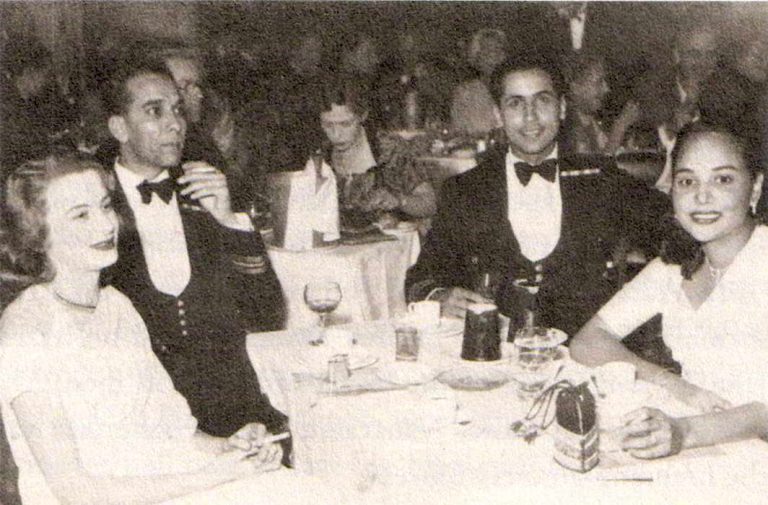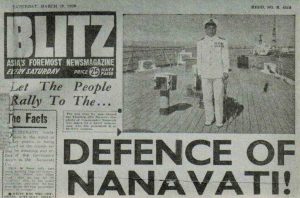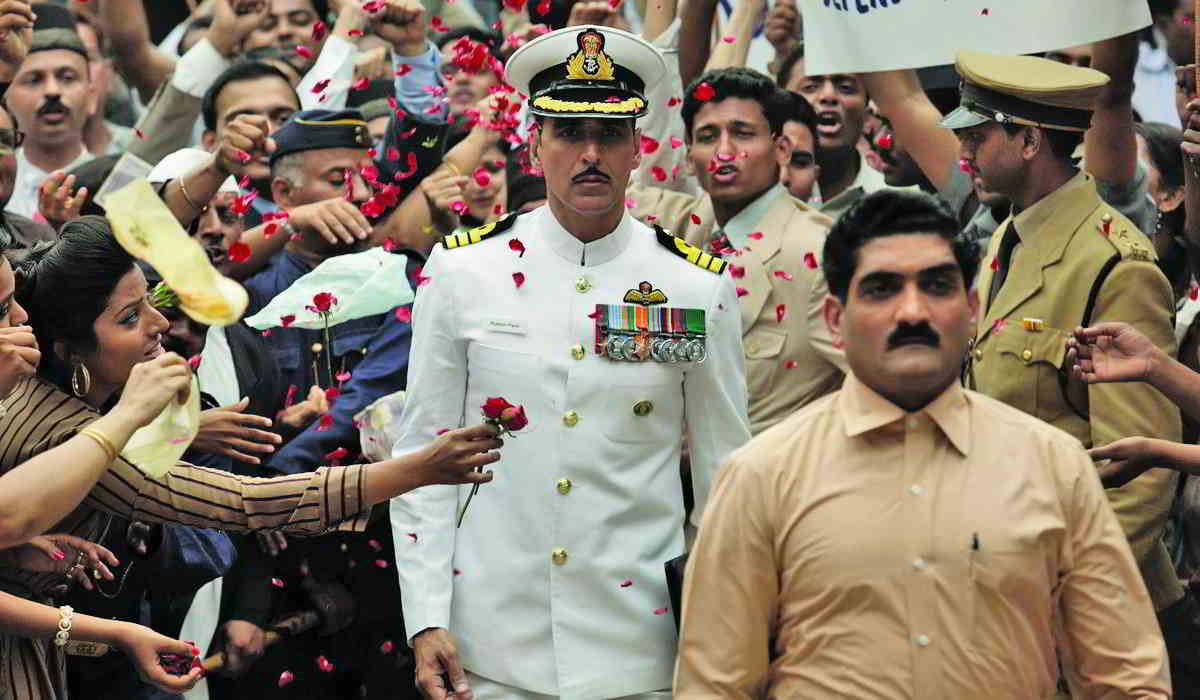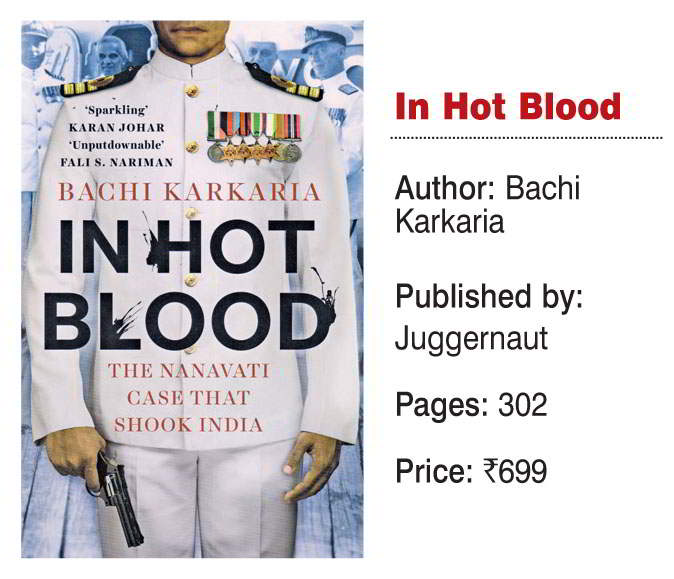
At lunchtime on 27 April 1959, the handsome naval commander Kawas Nanavati was told by his English wife Sylvia that she was having an affair with their flamboyant businessman-playboy friend Prem Ahuja. Later that afternoon, armed with a revolver, Nanavati stormed into Ahuja’s bedroom, and shut the door behind him. Three gunshots were heard going off inside. Ahuja was dead.
Ahuja’s murder set in motion an extraordinary public frenzy— thousands descended on the streets of Bombay, chanting in favour of the hero Nanavati, and the jury, swept off their feet by the dazzling naval officer in the dock, returned a ‘Not Guilty’ verdict.
This trial was the death knell of the jury system in India. It hurtled a judiciary keen on preserving justice into confrontation with an executive bending to the will of hysterical crowds and tabloids and Nanavati’s powerful friends in the establishment.
Here we present the naval officer’s deposition and cross-examination excerpted from Bachi Karkaria’s book In Hot Blood – The Nanavati Case That Shook India
The Trial of Kawas Manekshaw Nanavati in the Sessions Court, Bombay, of Judge R.B. Mehta: C.M. Trivedi representing the State Karl Khandalavala, Counsel for the Defence
Nanavati takes the oath on the Holy Avesta, the Zoroastrian prayer book. Here are reported excerpts from Commander Nanavati’s deposition and cross-examination:
Judge Mehta: It is alleged in evidence given against you that, at about 5 p.m. on April 27, Deputy Commissioner Lobo received a telephone message from Commander Samuel to the effect that Commander Samuel had directed you to surrender to Mr Lobo, as you had said that you had shot a man. Immediately thereafter you surrendered to Mr Lobo at his CID office and at that time you … had no cuts or injuries or blood marks on you. Do you wish to say anything in regard to this allegation?
Accused: Yes. The first part is correct, except that I did not tell Commander Samuel that I had shot a man. It is correct that I reported to Mr Lobo … It is correct that I had no cuts or injuries. I had slight rufflings on my wrist….
Asked about the evidence collected from Ahuja’s flat, Accused responds:
I do not know what was found during the panchnama… I recognize the brown envelope [Nanavati was given the gun with six cartridges in a brown envelope] ….

Judge: It is alleged that during the panchnama one chappal of Ahuja was found near the foot of the bed in the bedroom, and the other near the washbasin. A pair of spectacles was also lying in the bathroom. Do you wish to say anything?
Accused: I do not remember to have seen either the chappals or the spectacles. He [Ahuja] had the spectacles on as far as I know. I do not know about the chappals.
Judge: It is alleged that during the panchnama it was found that the bathroom was bloodstained and a kerchief and a bath towel stained with blood were lying there. Do you wish to say anything?
Accused: In the heat of the moment, I did not remember to have seen blood. As far as I can remember the only thought in my mind after Ahuja slumped was to get out of the house and report to the police.
Judge: It is alleged in evidence against you that on 28 April last, during the post-mortem examination of the body of Ahuja, a spent bullet was recovered, alleged to have been fired by you from the revolver. Do you wish to say anything?
Accused: I am not aware of the result of the post-mortem examination. I did not fire that bullet. It went off during the struggle.
Judge: It is alleged that the motive for the assault on Ahuja was that you suspected that Ahuja was on intimate terms with your wife, Sylvia Nanavati. Do you wish to say anything?
Accused: I did not assault Ahuja. I was aware that my wife was unfaithful. She had told me that afternoon.
Judge: Do you wish to say anything about the witnesses who have given evidence against you in this case?
Accused: Several of the witnesses have given untruthful evidence.
Judge: Do you wish to call witnesses for the defence?
Accused: I wish to call the following defence witnesses. Dr A.V. Baliga, Mrs Sylvia Nanavati, Major Sunane, Admiral R.D. Katari, Commodore Nanda, Lieutenant Commander Om Prakash, Lieu-tenant Commander Cooper, Captain Kohli, my mother Mrs Mehra Nanavati, Mr K.M. Desai, an advocate, a photographer of a newspaper, a clerk of the CCI [Cricket Club of India], and a clerk of the Girgaum Court.
Nanavati deposed that he carried the revolver to Ahuja’s residence because his wife had said that the latter ‘might shoot me. I took it for self-protection.’
Now Khandalavala (the defence lawyer) steps up. He shrewdly frames his questions in a way to show Nanavati as … an honourable man ready to give up his own life—and his wife— provided her lover was prepared to take care of her and their children.
Khandalavala: Have you seen active service in the Royal Indian Navy [as it was known before Independence].
Accused: I have put in 16-and-a-half years in the Navy. I have served one year in the North Atlantic on active service during the convoys to Russia. I was in the Mediterranean during the Anzio Operation, south of Rome. I was in Burma for six months during the Arakan Campaign.
Khandalavala: How conversant are you with the .38 calibre revolver produced as evidence?
Accused: I have fired hundreds of rounds from such a revolver.
Khandalavala: How good a shot are you?
Accused: I am considered a good shot. At a distance of 20 feet I am able to fire six shots within a radius of six inches… I have practised at moving targets….

On the following day, Nanavati deposes that he carried the revolver to Ahuja’s residence because his wife had said that the latter ‘might shoot me. I took it for self-protection.’ However, when he requisitioned the revolver, ‘all that was in me was to put an end to my own life. I was not thinking that I would need it for self-protection . . . It was on the way back from the ship that I had a sudden impulse to see Ahuja, and ask him what his intentions were.’ …
Khandalavala: Did you go to Ahuja’s house to persuade him to leave your wife alone?
Accused: No, I did not go to persuade Ahuja about anything. I went there only to ask him what his intentions were. I wanted to ask if he was prepared to look after my wife and children.
Nanavati… repeats that it was only ‘as I was about to go to Ahuja’s house, that I remembered what my wife had told me, that he might shoot me. So I felt I should take the revolver for self-protection.’
Khandalavala: After your wife’s confession about her relationship with Ahuja and being unfaithful to you, what were your thoughts after dropping her and the children to the Metro cinema.
Accused: …I was upset at the time. But no particular thought was uppermost in my mind.
Khandalavala: What did you tell your wife after she stopped you from going to see Ahuja immediately after your disturbing conversation?
Accused: I told my wife that we would talk it over the next day.
Nanavati says that there had been no thought of divorce.
Public Prosecutor (interjecting): When did you first think of getting the revolver on that day?
Accused: While driving to the ship after leaving my wife at the cinema, among the other thoughts that struck me on the way, was that I might as well draw a revolver as I was going to the ship. This was for the purpose of putting an end to my life….
C.M. Trivedi bears down on him, asking again why he took the gun up to the flat, if, as he keeps claiming, it was not his intention to shoot Ahuja. The accused holds his ground, saying that ‘the locking arrangements of the car which I was driving that day were faulty … [Also] if Ahuja had, by any chance, attempted to use his own revolver, if he had one, against me, then I would have used this revolver for my own protection.’
Judge Mehta repeats prosecution’s standpoint by asking point-blank, Did you go to Prem Ahuja’s flat with the intention of killing him?’
The question unwittingly helps build Khandalavala’s case.
In the tone that never falters, Nanavati denies this, saying that, as he had told the court, he was skilled ‘in shooting at moving targets’, and would have riddled him with bullets at the very start if he had gone there with intent to kill. He asserts that ‘the shots went off accidentally’ in the scuffle that followed as ‘Abuja tried to get hold of the revolver’.

